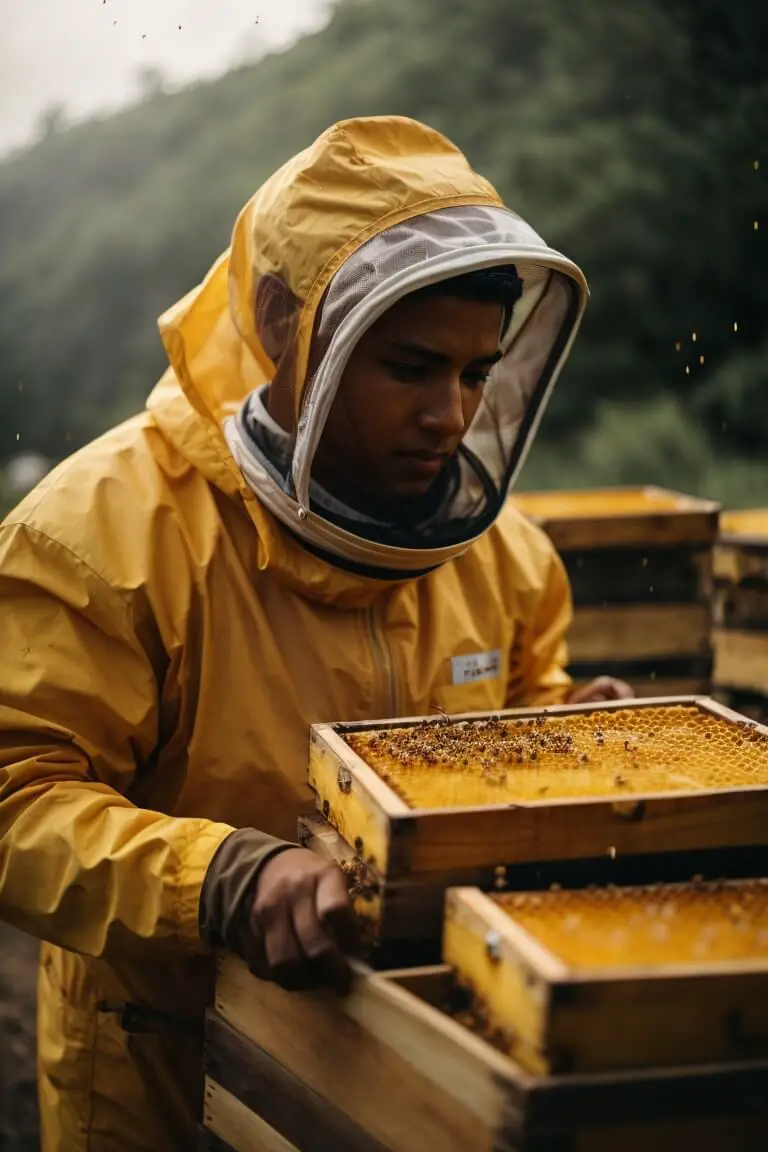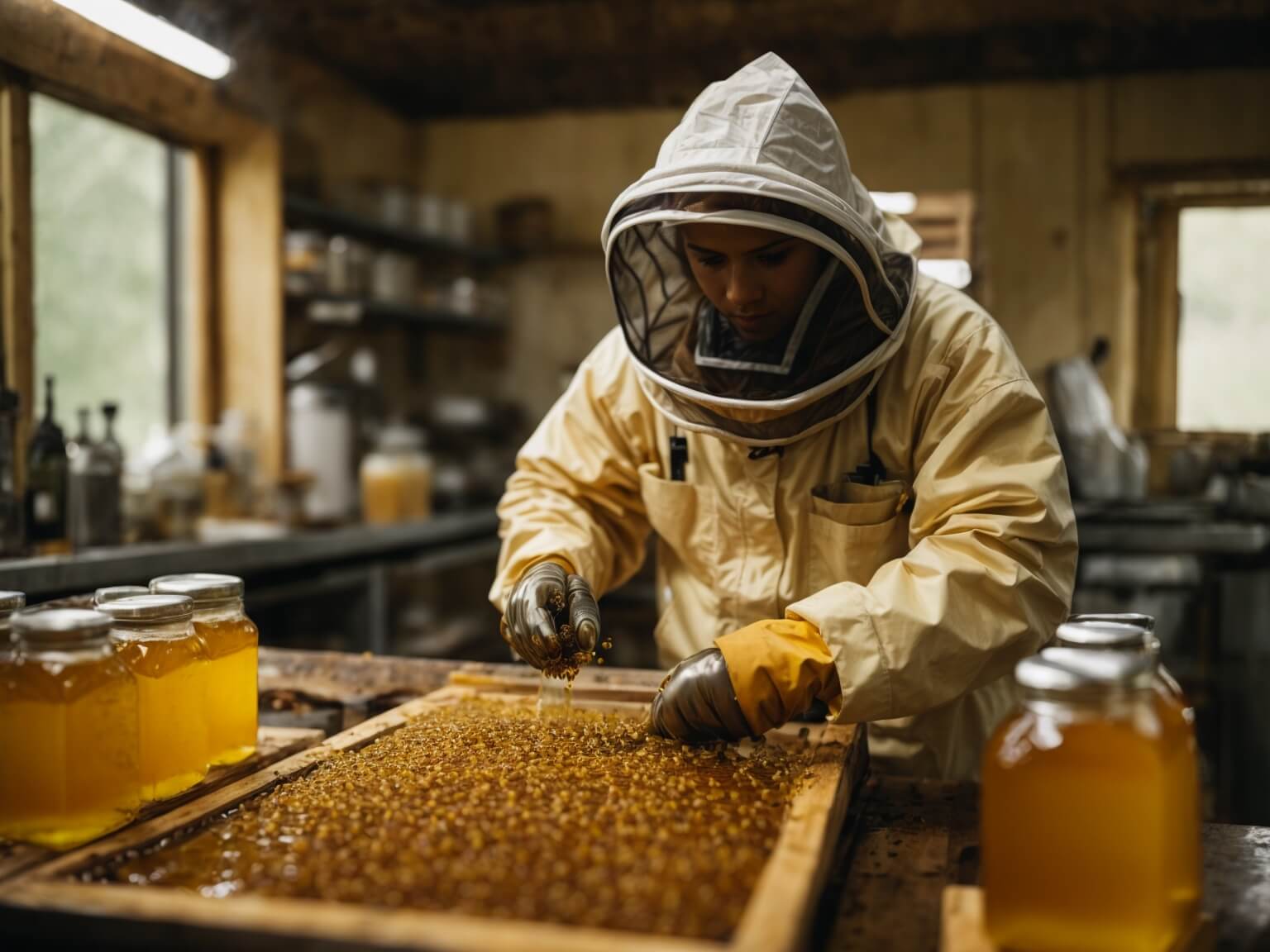As an avid beekeeper for over 15 years, I’m often asked by aspiring apiarists if there are any significant drawbacks to raising bees they should consider. While I’m extremely passionate about beekeeping and focus mostly on the many rewards, I also try to give an honest assessment of the not-so-fun aspects as well. Beekeeping is incredibly fulfilling, but does come with some real disadvantages and challenges at times that the wise newcomer ponders fully before jumping in.
In my experience, here are some of the key disadvantages that should be carefully weighed.
Costs of Equipment and Bees
The upfront investment in equipment and bees to start an apiary is substantial. At a minimum, you need the woodware for the hive itself (bottoms boards, brood boxes, frames, tops), a protective bee suit and veil, smoker, hive tool, gloves, feeders etc. Just this basic setup will likely cost around $500 for one hive. Add the cost of the bees themselves – a 3 pound package with queen runs $150-$200 – and starting with just one colony is close to a $700 endeavor. Building out multiple hives and expanding brings further expenses.
The costs add up quickly for those wanting to keep 3-5 hives or more. With each additional hive needing all that supporting equipment, you could easily spend $2,000-$3,000 or more for a small startup apiary. While it’s possible to build some of your own equipment like hives to save money, you still need to purchase the packages of bees, medications, hardware, extractors, bottling supplies, and other supporting gear. Beekeeping requires significant capital outlay in the beginning, which can deter newcomers on a budget.

Time Commitment
Caring for bees is not a quick, easy hobby; it requires major dedication and hands-on management. Hives need thorough inspections at least once a week during spring and summer to check on queen health, identify issues, ensure there’s adequate space, and other maintenance. Supplemental feeding, mite treatments, adding new boxes, making splits, removing honey – all take considerable time on a frequent basis.
Routine hive inspections and manipulations will take 1-2 hours per hive when you have multiple colonies. Major activities like harvesting honey can take the better part of a day or weekend to complete. Emergency issues like swarm captures or replaced damaged equipment add more unpredictable time demands as well. You also need to spend time planning, recordkeeping, ordering supplies, processing wax, and the myriad other tasks involved.
Beekeeping is not a hobby you can neglect for weeks on end – the bees require regular attention. Busy people may not have the ability to devote this level of ongoing time commitment that proper beekeeping requires. If you can’t invest the time needed for regular hive manipulations, it may not be the hobby for you.
Risk of Stings
Working closely with thousands of flying insects armed with stingers does carry an inherent risk of getting stung occasionally. While tactics like smoke can help deter stings, at some point you’ll likely receive a sting or two, which can be painful. This is just an occupational hazard that comes with beekeeping. Those highly allergic to bee stings likely want to avoid this pursuit entirely due to the severe threat if stung. For others willing to tolerate some stings, it’s just something that you sign up for by taking up this hobby. Stings will happen if you handle bees regularly.
In my first few years learning to handle hives I’d get an occasional sting or two per inspection. Now with experience I rarely get stung during routine hive work. But make no mistake – you will deal with stings as a beekeeper, especially when doing tasks like removing honey supers or capturing swarms. The risk varies based on colony temperament. Some hives are quite docile while others can be quite feisty and sting-happy. Moving slowly and gently while using smoke helps minimize stings, but it’s simply an expected downside of beekeeping.
Possibility of Allergic Reactions
Related to stings is the more concerning chance of having a serious allergic reaction. A small percentage of people develop anaphylaxis in response to bee venom, which can be life threatening. This poses a grave health risk if you happen to be among those highly allergic but don’t realize it until receiving multiple stings. Even with emergency medical care on hand, this potentially deadly reaction makes beekeeping too risky for some.
Beekeepers with common allergies or asthma seem more prone to venem sensitivity that leads to severe reactions. If you have a history of allergies, or have never been stung before, it’s smart to get an allergy test first. Then even if highly allergic, you may be able to receive immunotherapy to reduce the response over time. Still for some, that severe reaction potential means beekeeping is an activity they sadly cannot pursue despite interest.

Physical Nature of Tasks
Beekeeping definitely keeps you active and moving, which can also be seen as a downside by those adverse to physical exertion. Hive components can weigh 50+ pounds and require heavy lifting to move and stack. Bending, squatting, standing for long periods, climbing ladders to reach hives, cranking extractors, hauling and bottling honey jars – these tasks and more get a real workout. The physical nature of the hobby only increases as your apiary grows in size.
If you have existing back problems or limited mobility, the physical demands of beekeeping may be too challenging. People with chronic conditions like bad knees or backs that limit lifting and mobility will likely struggle with some beekeeping tasks. Using carts or other tools to move heavy loads helps, but strength and stamina are still required. Faliling to be able to handle the most labor-intensive aspects may jeopardize the care and health of your colonies.
Colony Loss Factors
It’s heartbreaking when a hive you’ve nurtured suddenly dies off or absconds due to disease, varroa mites, wasps, extreme weather, or other causes you couldn’t control. Colony loss is almost inevitable eventually as a beekeeper, which is difficult on both beekeepers and their bees emotionally. Recovering from major die-offs takes time, effort, and money to replace bees and equipment.
You spend months feeding, monitoring, splitting, and tending to a colony only for it to collapse and die during tough winters or due to tragic pest issues like hive beetles. Losing strong hives that once produced towering honey frames is demoralizing. You do everything right as a beekeeper but still lose colonies – that stings the heart and wallet. The colony losses, despite your best efforts, are a tough downside that comes with the territory.
Harvesting and Processing Challenges
While the sweet rewards of harvesting honey makes the effort worthwhile, the process itself can be sticky, messy, sweaty work. Extracting honey from the frames, bottling, labeling, cleaning equipment requires significant labor and time. Busy beekeepers may need to recruit family or friends just to help handle the harvesting workload when managing multiple hives. Don’t expect the fruits of your beekeeping to come easy when the time comes – processing honey takes real work.
Extracting honey is demanding multi-day process. First you have to uncap wax from frames either by heating knives, serrated scrapers, or hot air. Then the frames go into extractors to spin out honey by centrifugal force. Next the heavy tubs of honey must be strained, filtered, and bottled. Equipment must be cleaned thoroughly afterwards to avoid contamination. It’s days of lifting, cranking, pouring, bottling – expect an exhausting but satisfying experience harvesting the honey payoff.
Marketing and Sales Effort
If selling your bee products is your goal, be prepared to invest substantial time in marketing your apiary operation and making sales – it won’t happen automatically. You’ll need to secure licenses, permits, liability insurance, labels, packaging, and market the products through websites, farmers markets, stores and other direct and indirect sales channels. Simply having great honey doesn’t mean customers will magically appear – you must strategically generate demand.
Promoting your honey takes work – social media marketing, striking deals with vendors to carry your products, attending markets to sell in person, negotiating with restaurants to use your honey. Don’t expect quick success – marketing yourself is a time investment and learning curve. Some beekeepers even get certified organic to improve marketability. Generating profit means dedicating real time to the business side of beekeeping.
Storage Considerations
All those hive boxes, frames, supers, extractors, tools, and other beekeeping equipment take up considerable space for storage when not in use. Secure, weather-tight storage out of sunlight is ideal. That may require building or buying a shed for storage, or sacrificing space in garages or basements. Getting creative with storage solutions is a necessary reality, especially for urban beekeepers will small home lots.
With multiple hives, you quickly accumulate piles of spare supers, brood boxes, lids, bottom boards and more gear that stacks up when stored. Repairs and assembly require dedicated workspace. Extracting honey makes quite a mess that needs cleaning too. So secured, weather-proof storage space becomes essential. Lack of storage can force sales of equipment or inefficient use. It’s a common early constraint to growth for apiarists.
Potential Neighbor Conflicts
You may face resistance from neighbors concerned about hives being kept nearby. Some may have irrational fears of Africanized bees, or simply object to increased insect activity. Mud wasps love building nests in stored supers. And neighbors may balk if they see you covered in swarming bees occasionally. While their concerns are often overblown, managing neighbors’ perceptions of hobby beekeeping is an ongoing challenge in community settings.
It’s good practice to inform adjacent neighbors before establishing an apiary so they understand what’s happening. Occasionally offering small honey gift jars also improves relations. Be ready to calmly address concerns and misconceptions. Hide unattractive aspects like swarm captures from open view when possible. Following local ordinances shows you’re a responsible beekeeper. Good fences make for good neighbors – avoid giving cause for complaint and you can coexist.
In summary, while I believe the numerous rewards of beekeeping far outweigh the drawbacks for those passionate about the hobby, the disadvantages are very real and worthy of careful thought. Going in with eyes wide open about the costs, commitment, risks, frustrations, and physical demands enables new apiarists to prepare accordingly and decide if this hobby aligns with their goals, means, and tolerances. An informed decision tends to make for more successful, sustainable beekeepers in the long run. Personally, I can’t imagine life without a hive or two and find the challenges manageable for doing what I love. But beekeeping is not for everyone – consider both sides of the equation fully as you proceed.
